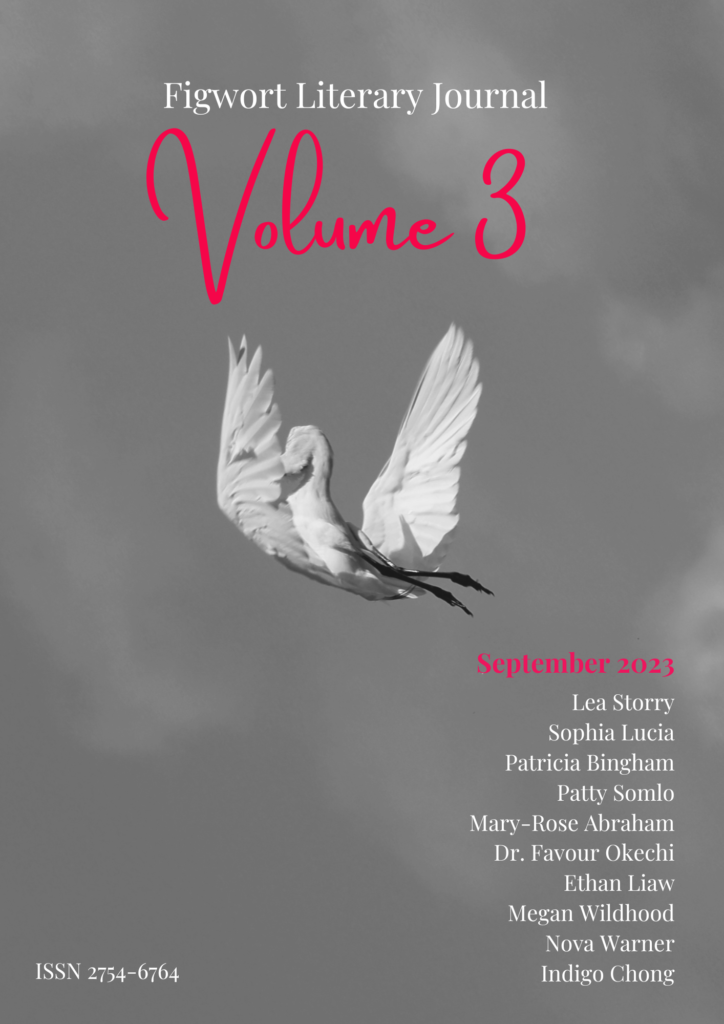Black Gold
‘Black Gold’, by Mary-Rose Abraham
‘The Muziris papyrus provides unique details about the trade between Roman Egypt and India … Muziris was a port in the Malabar region of southwest India (Kerala), which Periplus of the Red Sea, from the mid-1st-century CE, says was visited by large ships from Egypt to acquire pepper and malabathrum … and also pearls, ivory, silk, nard, and gemstones.’ – Oxford Classical Dictionary
‘You will go to the port tomorrow.’
The tall man pointed at Velli. He did not know her name. His voice made her look up. Her hand still clutched the vine, fingers poised to remove the peppercorns strung like rows of beads.
Velli was surprised; she had never made this trip. It was always the other young girls who picked much faster than she did. Perhaps they were all going together. She hoped so. Velli did not want to go far on her own.
The man walked away. Velli’s hands traced the coils of the vine as it wrapped around the tree. She picked it clean of its jewelled fruits, some red, others still a raw green. A taller girl picked the next section.
Velli’s mother woke her early the next morning. It was still dark outside. Stars twinkled through gaps in the treetops surrounding their hut. Her mother lit a fire and stirred porridge. Velli warmed her hands around the steaming bowl. She tipped the lumpy mass into her mouth, ignoring how it burned her tongue, and felt its heat travel down her throat.
A chill breeze blew outside. Velli and her mother walked in silence, holding their thin wraps tight around their arms. No path had been cleared, so they stepped over exposed roots and crowded saplings. The chorus of frogs and songs of birds would not begin for a few hours.
They emerged into a clearing lit by torches. Bullock carts lined the pebbled road that curved down the hill. Men heaved sacks into the nearest carts. Rough coir string secured the sacks but they still emitted the sharp aroma of pepper. Somewhere in these lumpy bags were the peppercorns Velli had picked, now dried and sorted and bound for a long journey from these mountains to the port.
A group of girls clustered near a cart. Velli squeezed her mother’s hand and then ran towards her friends. They smiled but did not speak. The only sound was the soft thudding of sacks.
The girls climbed into a half-loaded cart. The driver laid a light crop on the stocky bulls. They started forward, last in the caravan. The workers remaining behind snuffed out the torches. The bulls’ pearl-coloured horns curved high above their nodding heads and glowed in the semi-dark. Velli yawned and lay her head on a sack. The steady rhythm of the cart soon put her to sleep.
Light pulsed against her eyelids. The sun suffused everything in brightness, heating the dampness that settled on the wild grass by the roadside, the sacks of peppercorns, and her own skin. Velli felt tired, though she had been sleeping for hours. She looked at the mountains behind them. Her mother was there, and the cool, dry air she knew.
The other girls stirred as well. The caravan stopped near the riverbank. They were given a late breakfast. The driver of the cart scrambled down to the river and scooped from the gushing water. The girls drank from the half-shell of a coconut scraped clean and passed it around until all six of them had their fill.
They followed the river for the rest of the day. Later that night, she fell asleep to the sound of the current. When she woke, it was early morning and the cart had stopped. The caravan had arrived.
Women sat along the roadway, baskets full of fresh-caught seafood at their feet. They haggled with customers and wrapped glistening fish in banana leaves. A man shouldered a heavy coir bag and balanced another overhead, a coiled cloth cushioning his head. An awning of dried palm leaves shaded a pack of sleeping dogs.
Most surprising of all was the water. The river they followed had entranced Velli as it meandered past large boulders and weaved through clusters of huts. But here at the port, it had widened to ten times its size. Velli could barely see the other side of it. Even the trees opposite seemed as small as the splinters that sometimes lodged in her fingers while she worked. Men paddled long, wooden canoes in every direction.
Velli watched from the cart, until a worker told her to get down. The girls were divided into pairs. She held the other girl’s hand tightly and they followed the worker to a row of brick warehouses. Velli stepped inside. Sacks were clustered into piles. The air was pungent. Velli’s nose tickled so much that she had to let go of her friend’s hand so she could pinch her nostrils.
The worker untied one of the sacks and turned it toward the floor, showering peppercorns over a mat spread the length of the warehouse. He did the same with sacks from different piles.
Two men walked toward the mat. The ship’s captain had a light tan glossing over skin as pale as bull horns. Velli had never seen anyone like this before. But it was the merchant, nearly as dark-complexioned as Velli, who transfixed her. Threads of gold formed intricate patterns along the folds of cotton cloth draped around him. Gold hoops hung from his earlobes, and matching necklaces looped from throat to chest. The jewels on his rings flashed as he gestured toward the mat. Every peppercorn she had picked, every sack carried from the mountains, the entirety of the caravan, this was all his.
The merchant crouched down and grabbed a fistful of peppercorns. He ran them through his pale fingers and smelled them. He pinched them until they became powder-like and tasted them. Then he tossed the rest back onto the pile and nodded to the captain with a satisfied smile. Both men walked out the door. Before Velli could look after them, a worker shoved her towards the mat.
‘You girls! Every one of these has to go back into the sacks. We cannot lose a single one!’
The girls scrambled about the room on hands and knees. They searched after peppercorns which had rolled into corners and crevices, under sacks. Velli’s hands were full.
Afterwards, while the workers were busy tying up the sacks, Velli’s friend stopped to watch the fish sellers. Velli walked toward the wharf. She saw the two men preparing to board a boat. She hid herself behind a pile of sacks and watched.
They climbed into the canoe and sat on planks facing each other. The light shifted. Velli saw that she had missed a peppercorn. It was nestling in a curl of the merchant’s thick black hair. She giggled. It had probably bounced away from the rest and landed softly without the man realising.
The rowers steadied the boat with their oars. The merchant nodded and they pushed away. Velli watched the canoe glide into the river. The workers on the wharf propped themselves up against the sacks.
‘His biggest shipment yet! So many weeks on the Hermapollon, all the way to the land of the Yavana.’
He turned to the other. ‘What is the place called?’
‘The ship is going to Berenike. But master will go on to Alexandria.’
‘Ah, yes. What a treasure the master will get. Truly, our pepper is black gold. When he comes back, he will be dripping with even more jewels!’
They laughed and waited for the next boat. By nightfall, all the sacks had to be transported to the ship anchored out at sea.
Velli watched as the men in the canoe receded. She thought about the peppercorn in the merchant’s hair. Would it make it to the ship? Or would it fall into the water? As she wondered, the rowers steered the boat through the current, and soon the merchant appeared as small to Velli as the errant peppercorn.
Mary-Rose Abraham is a multimedia journalist and recent creative writer (HeartWood Literary Magazine). Her work can be found at https://maryroseabraham.com/.



